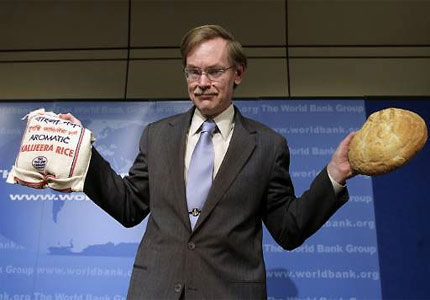DUSHANBE, February 17, 2011, Asia-Plus — According to new World Bank group numbers, rising food prices have driven an estimated 44 million people into poverty in developing countries since last June as food costs continue to rise to near 2008 levels.
“Global food prices are rising to dangerous levels and threaten tens of millions of poor people around the world,” said World Bank Group President Robert B. Zoellick. “The price hike is already pushing millions of people into poverty, and putting stress on the most vulnerable, who spend more than half of their income on food.”
According to the latest edition of Food Price Watch, the World Bank’s food price index rose by 15 percent between October 2010 and January 2011, is 29 percent above its level a year earlier, and is only 3 percent below its 2008 peak, when surging costs sparked riots in more than a dozen countries.
Among grains, global wheat prices have risen the most, doubling between June 2010 and January 2011. Maize prices are about 73 percent higher. Sugar and edible oils have also gone up sharply. But crucially for many of the world’s poor, rice prices have increased at a slower rate than other grains, the World Bank said.
According to Food Price Watch, the increase in extreme poverty (under US$1.25 a day) due to the price hike is associated with higher malnutrition, as poorer people eat less and are forced to buy food that is both less expensive and less nutritious.
The World Bank expects volatile, higher than average grain prices until at least 2015. In the poorest countries, where people spend up to two-thirds of their daily income on food, rising prices are re-emerging as a threat to global growth and social stability.
The World Bank warns some nations may make the mistake of imposing curbs on shipments. According to Bloomberg Television, Mr. Zoellick noted “If we don’t get a relief on the weather side, then I foresee conditions getting worse, and mistaken policy actions such as exports bans or other tax or price controls will exacerbate the problems.” Trade curbs were a feature of the 2008 spike in food prices, when India and Vietnam were among nations that restricted or suspended shipments.
World Bank Group President calls on all countries to provide wide public access to information about quality and quantity of national grain reserves.




